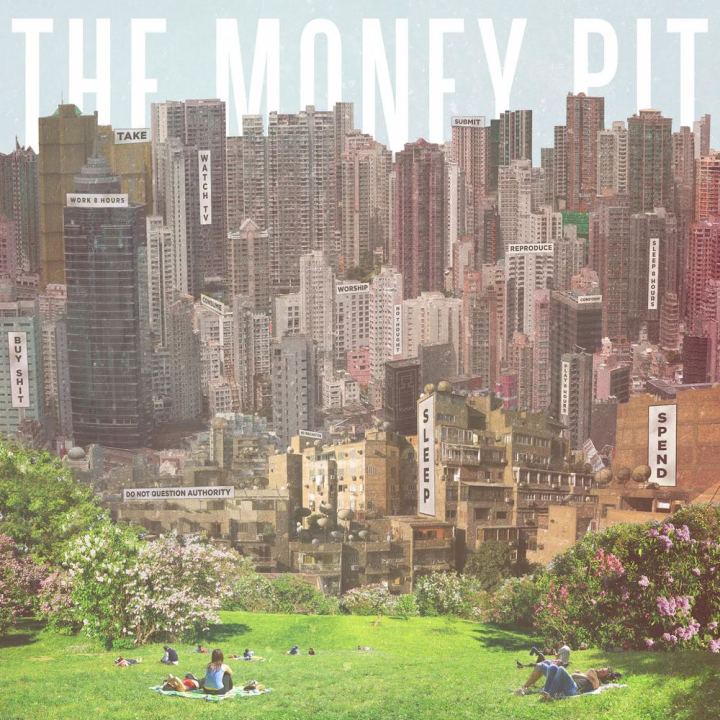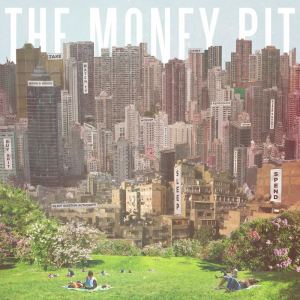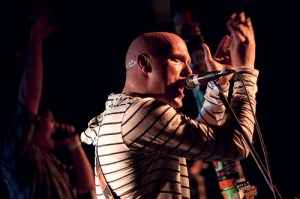
Alliance Commander: “Seems odd you’d name your ship after a battle you were on the wrong side of.”
Malcolm Reynolds: “May have been the losing side. Still not convinced it was the wrong one.”
Firefly, ‘Bushwacked’
—
When we lost Gatsbys American Dream after their self-titled album in 2006, they were – in their own words – no longer mad. They were tired. They were sad. And they had good reason to be. More than maybe any other band during the strange but remarkable progressive/rock/pop movement of the mid-aughts, Gatsbys American Dream believed in an artist’s right to make art without being subjugated to corporate, capitalist greed. They resisted the idea that bands were a commodity to be squeezed into profit models for the benefit of labels and show promoters. That resistance was manifested in their art. Gatsbys songs played in odd time signatures, lacked identifiable verses or choruses and relied on lyrics that mixed literary allusions, pop culture references and explicit criticism of their own industry. Gatsbys American Dream fought for economic equity with their art in a way that arguably no band has done before or since.
Signs of the band’s frustration were visible from the start. On the band’s debut album, Why We Fight, Gatsbys eviscerated the financial politicking of their local scene in the song ‘Nobody Wins’. Hints of a greater disillusionment appeared on their sophomore album, Ribbons & Sugar, wherein a metaphor based on George Orwell’s Animal Farm condemns industry cogs who “consume but do not produce.” Later on Ribbons & Sugar, vocalist Nic Newhsam wails about the band’s lack of agency: “Who decides…what ends up on the cutting room floor? Apparently it’s not my choice to make.” That lack of choice was problematic for Gatsbys.
After the success of Ribbons & Sugar, several labels invited the band to showcase in pursuit of a larger recording contract. The experience was an education in industry economics, as guitarist Bobby Darling would later explain:
I remember we showcased for a record label once. The guy who ran the label sat on a couch and watched us play, and after we finished he said that no label in their right mind would sign us because we didn’t have choruses in our songs. I don’t know if he expected us to thank him for the words of wisdom. I think I was just irritated. I’m still irritated. And not because he was a condescending shit head. I’m irritated because he was right. We were never going to fit into this industry. We were never going to sell a lot of records. For the most part, this business rewards you for conforming, it encourages mediocrity, and it tries to stamp out creative thought. And what we were making was just art, all along. So we were stomping mad. We got tired later, but first we were mad.
That anger fueled an EP, In the Land of Lost Monsters, that may remain the greatest middle-finger/mission-statement ever delivered to the independent music industry. Structurally and lyrically the album rages against the conformity that prospective labels wanted to force on the band. In the EP’s final track, ‘The Dragon of Pendor’, Newsham proclaims, “Where’s the fucking chorus? Here it is. But you can’t fuck with my integrity.” The band promptly breaks into an eight-bar passage that would have been the catchiest chorus on any pop-punk record that year. Here it is, indeed.
Gatsbys would eventually sign with Fearless Records and release the band’s third full-length album, Volcano. As an album that seems to exist simply for the sake of the artists’ desire to explore their art – with no overwhelming anger or industry-reforming agenda – it could be argued that Volcano was the type of record that Gatsbys had always wanted the freedom to make. And while Volcano was likely the band’s most accessible work and would become their most well-known album, it does not appear to have bought them the freedom for which they had long agitated.
Gatsbys American Dream, the band’s fourth full-length album, released only a year after Volcano, opens with Newsham singing,
“I’m not mad, I’m just tired…I hate this place…it doesn’t seem like music at all…and my art is no art at all, my art is just bought and sold.”
Two songs later, ‘Badd Beat’ incinerates the exploitative nature of tour management. Perhaps fittingly, the band dropped off of Warped Tour before Gatsbys American Dream was released and, shortly thereafter, ceased touring entirely. A few months later, Gatsbys announced an indefinite hiatus. And so, with a whimper and not a bang, Gatsbys American Dream faded from the scene. They probably could have kept going, churning out work for which they may have lost their passion. But they didn’t. Rather than drag it out, they chose to walk away.
Those of us who loved the band, and I count myself among them, will never consider the works of Gatsbys American Dream as anything but the greatest success. Gatsbys albums are rich and deep, brimming with innovation, intellect and heart. But it’s not a reach to say that, in at least some respect, the band had been defeated. They fought for change in a twisted industry and, for all their efforts and honesty, they weren’t able to create it.
—
The Money Pit, a two-man outfit consisting of Darling and Newsham, is not Gatsbys American Dream. That’s an important distinction. You could argue that discussing Gatsbys at all here does a disservice to The Money Pit, an act that certainly deserves to – and has the chops to – stand on its own. But given that Newsham drops multiple lyrical call-backs to Gatsbys songs on The Money Pit’s self-titled debut, it seems to safe to suggest that neither he nor Darling are running from their past.
Fortunately, they’re not consumed by it either. The Money Pit is a fresh experience. The songs, even when they’re fast, are relaxed – drained of that youthful anger – in a way that Gatsbys songs never really were. The rhythms are thumping, the instrumentation is interestingly varied and the chord progressions rarely unfold as you’d expect. And yet everything on the album flows naturally and seems, reassuringly, in its place.
Three of the album’s pre-released tracks, ‘I Want My Money Back’, ‘Control Everything’ and ‘Killing Time in Hawaii’, are obvious singles but each song on The Money Pit has its own charm. After ‘Call the Cops’ pushes the pace, it takes a breather with cut time harmonies; ‘No Problemó’ delivers a delightfully laid back guitar solo; ‘Lawrence, Kansas’ closes with a fun set of counterpoint vocals; and ‘Devastator’ (which, given the abundance of Transformers GIFs on the band’s Twitter account, I’m choosing to believe was named after a certain Constructicon) is as crunchy and dark as its name implies. When it comes to song construction, Darling and Newsham remain master builders.
I was surprised to find that, even though Darling is one of the most stylistically unique guitarists of his generation, he only rarely delves into his trademark frenetic strumming patterns and bold riffs on The Money Pit. The album’s songs are constructed in a deliberate and borderline-traditional fashion that’s more in line with Darling’s side projects, Search/Rescue and Places & Numbers, than anything Gatsbys ever released. Choruses even make appearances across the album, although when they repeat it’s often in modified form. Old habits die hard.
But, for all the craft and power of the instrumentation, Newsham’s vocal performance – and the melodies and lyrics that he delivers – are the headline act here. The literary bent of Gatsbys has been replaced by a more conversant and personal tone. It would be easy for this lyrical approach to fall flat or come across as shallow and trite. The Money Pit doesn’t dodge that obstacle so much as launch entirely out of its orbit. The album’s lyrics – which rely heavily on Newsham’s ability to deliver unflinching honesty – are incisive, cutting and occasionally hysterical. It’s rare to find a band capable of ably navigating the path between lamenting the disappointments of aging, mocking the regurgitated content of an overflowing internet and making robot jokes, but The Money Pit is up to the task. And that’s just the opening track.
As the album keeps churning, Newsham and Darling continue to deliver brilliantly honest assessments and confessions through a series of melodic lines that will burrow deep into your brain. Some of these melodies, built on bizarre rhyme schemes and with cadences drawn from unusual places, offer a graduate-level course in melodic construction. Once again: it’s great to see the masters back at work.
Ultimately, The Money Pit is a fantastic album that should be heard by anyone with even a passing interest in modern rock or pop music. It offers catchy songs, fascinating lyrics and interesting instrumentation. And while an intimate knowledge of the history and catalog of Gatsbys American Dream is not necessary to enjoy the summer-rock vibe of The Money Pit, it certainly enriches appreciation. That Darling and Newsham know this is never more apparent than when Newsham seems to address the demise of Gatsbys in ‘Killing Time In Hawaii’ stating, in customarily forthright fashion,
“I could drag it out for another year. Yeah, I could say what I think they wanna hear. But fuck that shit.”
That song’s next few lines, which lament the prospect of wasting away at a meaningless job, strongly echo the sentiments of ‘Work Lies Sex Love Fear Hate Frienship’ from Ribbons & Sugar before directly referencing ‘The Hunter’ from Volcano. Fans of Gatsbys will likely revel in these references; I don’t deny that they increased my enjoyment of The Money Pit. I’ll suggest, though, that the real joy in these moments isn’t the shot of nostalgia but rather the confirmation that, while our heroes may have disappeared for a while, they never gave up. They may have fought on the losing side, but they – and I with them – are still not convinced it was the wrong one.





this is the best read i’ve had all week and honestly the best way to introduce GAD culture and legacy. I’ll be celebrating this friday with this grandious brand new release, yeah its finally fun to be pissed. i hope i have your permisson to show this article to all my friends in Guadalajara, Jalisco. Mexico. thank you for everything you mentioned in here! i surely enjoyed and appreciated it while reading! could you please tell me what’s the refernce of the hunter in KTIH?. thanks again and sorry for my bad english -chris
Glad you enjoyed the article, Chris. In ‘Killing Time In Hawaii’ Nic sings, “Gotta make a move, all they do is take” which references a line in ‘The Hunter’ that reads, “I’m sure that there’s a Hell and there’s room for all of us, because all we do is take. All we do is take.”